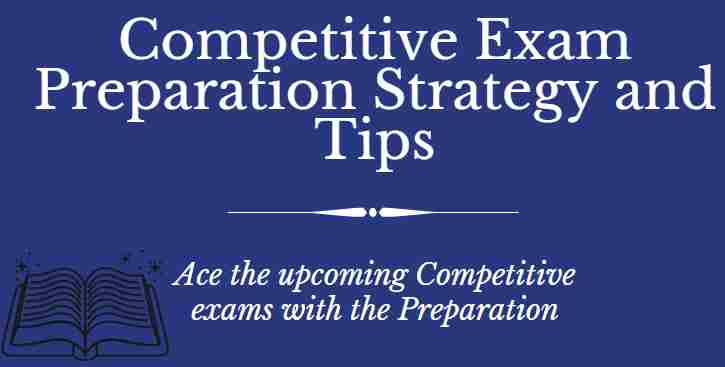Job Details
Post Views :
How to Ace Competitive Exams - Ultimate Guide for Students
Introduction
Preparing for competitive exams can be challenging, with high stakes and intense pressure. This guide covers proven strategies to help students succeed in exams like the GRE, GMAT, SAT, and more. By following effective study methods, time management techniques, and mental preparation, students can optimize their study sessions and approach exam day confidently.
Understanding the Exam Format and Syllabus
Each competitive exam has its own format and syllabus, so understanding these early on can be a major advantage. Familiarize yourself with the exam structure, question types, and scoring pattern. Many exam boards provide free resources or sample papers, which can be very helpful in giving you a feel for the exam.
Key points to cover:
Review the official exam syllabus and outline.
Get to know the types of questions (e.g., multiple-choice, essays).
Understand the marking scheme to prioritize high-value sections.
Creating a Realistic Study Plan
A well-structured study plan is essential for keeping on track. Break down the syllabus into manageable portions and set goals for each week. Ensure that your plan includes revision time, so you can revisit topics and reinforce learning.
Key tips:
Use a calendar or planner to organize your study sessions.Divide subjects or sections into daily and weekly targets.Schedule short breaks to avoid burnout.Using Quality Study Resources and Practice TestsInvesting in high-quality study materials is worth it, as these resources are designed to cover the syllabus comprehensively. Practice tests simulate the exam environment and help you manage time effectively. Taking these regularly will give you insights into areas that need improvement and build confidence.
Suggested resources:
Kaplan and Princeton Review for SAT and GRE prep.Official guides like GMAT Prep by GMAC.Online platforms like Magoosh or Khan Academy for free resources.Key features of effective study resources:
Detailed explanations and example problems.Practice tests and mock exams.Video tutorials or interactive learning options.Mastering Time Management and PrioritizationCompetitive exams often come with strict time limits, so it’s crucial to learn time management techniques. Practice answering questions quickly and avoid spending too much time on difficult sections. Prioritize high-scoring sections based on the marking scheme to maximize points.
Time management strategies:
Use the Pomodoro Technique for focused study sessions.Set timers during practice tests to improve speed.Focus on scoring sections first before tackling harder questions.Staying Mentally and Physically PreparedExam preparation isn't just about studying; it’s also about keeping your mind and body in good shape. Regular exercise, a balanced diet, and adequate sleep can improve focus and concentration. Incorporate stress-relieving activities, like meditation or breathing exercises, to manage exam anxiety.
Well-being tips:
Prioritize sleep, especially leading up to the exam.
Practice mindfulness to reduce stress.
Eat brain-boosting foods, such as nuts, fish, and leafy greens.
Strategies for Exam Day Success
On exam day, make sure to eat a healthy breakfast and arrive early to avoid any last-minute stress. Read each question carefully, allocate time for each section, and move on if you get stuck. Remember, it’s about working efficiently under pressure.
Exam day checklist:
Bring necessary documents (e.g., ID, exam confirmation).
Practice deep breathing if you feel anxious.
Stick to the time limits you’ve practiced during preparation.
Conclusion: Putting it All Together for Exam Success
Acing a competitive exam requires more than just hard work; it requires strategy, discipline, and a strong mindset. By understanding the exam format, using high-quality resources, practicing time management, and maintaining mental and physical well-being, you’re on the right path to achieving your best score.

Comment as a guest
Login
Discussion
-
Guest
May, 28, 2024
1
-
Guest
May, 28, 2024
1
-
Guest
May, 28, 2024
1
-
Guest
May, 28, 2024
1
-
Guest
May, 28, 2024
1
-
Guest
May, 28, 2024
1
-
Guest
May, 28, 2024
1
-
Guest
May, 28, 2024
1
-
Guest
May, 28, 2024
1
-
Guest
May, 28, 2024
1
-
Guest
Feb, 14, 2023
hi
-
Guest
Feb, 14, 2023
i need job
-
Guest
Feb, 14, 2023
I need a job plz
-
Guest
Feb, 14, 2023
I need a job plz
-
Guest
Feb, 14, 2023
hajiismail3024@gmail.com
-
Guest
Feb, 14, 2023
Hajiismail3024
-
Guest
Feb, 14, 2023
hakimshahzad45@gmail.com
-
Guest
Feb, 14, 2023
I am sajid Ali driver sindh govt fanince daliy wages
-
Guest
Feb, 14, 2023
Driveer
-
Guest
Feb, 14, 2023
Muhammad Imran
-
Guest
Feb, 14, 2023
Bhagalpur
-
Guest
Feb, 13, 2023
I need a job
-
Guest
Feb, 13, 2023
I need a job
-
Guest
Feb, 13, 2023
AsifAslam
-
Guest
Feb, 13, 2023
hi
-
Guest
Feb, 13, 2023
Www. Sindhpolice. Gov. Pak
-
Guest
Feb, 13, 2023
saleemkhan65938@gmail.com
-
Guest
Feb, 13, 2023
Mohammad saleem
-
Guest
Feb, 13, 2023
Draftsman
-
Guest
Feb, 13, 2023
Hello g kab Hoga
-
Guest
Feb, 13, 2023
Hello g kab Hoga
-
M yaseen M yaseen
Feb, 13, 2023
How can I apply
-
M yaseen M yaseen
Feb, 13, 2023
I need a job
-
M yaseen M yaseen
Feb, 13, 2023
03110894879
-
M yaseen M yaseen
Feb, 13, 2023
I need a job
-
Guest
Feb, 13, 2023
03110894879
-
Guest
Feb, 13, 2023
I need a job
-
Guest
Feb, 12, 2023
awaissami232@gmail.com
-
Guest
Feb, 12, 2023
Buner
-
Guest
Feb, 12, 2023
Ejaz ali
-
Guest
Feb, 12, 2023
farahayaz
-
Guest
Feb, 12, 2023
Noor Muhammad 03438317424
-
Guest
Feb, 12, 2023
Noor Muhammad
-
Guest
Feb, 12, 2023
Khadim 03422372098
-
Guest
Feb, 12, 2023
Yes
-
Guest
Feb, 12, 2023
Yes
-
Guest
Feb, 12, 2023
G
-
Guest
Feb, 12, 2023
Yas
-
Guest
Feb, 12, 2023
Hi
-
Guest
Feb, 12, 2023
Khalil awan
